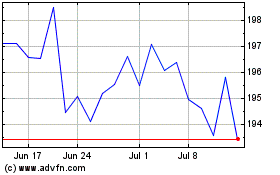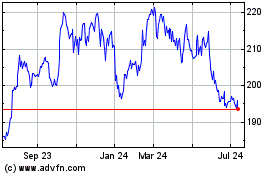Regulators Will Target NYSE, Deutsche Boerse Clearing - FOA
March 15 2011 - 11:43AM
Dow Jones News
European regulators could push merger partners NYSE Euronext
(NYX) and Deutsche Boerse AG (DB1.XE) to spin off part of their
derivatives clearing business, according to a senior industry
lobbyist.
Fusing NYSE Euronext's London-based Liffe unit with the German
company's Eurex business would create a dominant force in
European-listed derivatives, and antitrust officials may target the
profitable clearing segment as part of any approval, said Anthony
Belchambers, chief executive of the Futures and Options
Association, which represents banks and brokers in the region.
"Clearly they're going to be looking very closely at this,"
Belchambers said of the regulators' stance. He was speaking in an
interview on the sidelines of an industry conference organized by
the Futures Industry Association, the FOA's U.S. counterpart.
Deutsche Boerse has in the past successfully fought efforts by
some European lawmakers to force the separation of its clearing
business, and analysts said a renewed push could effectively sink
the planned NYSE Euronext deal.
Belchambers said regulators are likely to focus on exchanges'
control of clearing trades in futures and options contracts listed
on their markets, a framework that has enabled market operators
like Eurex and Liffe to fend off competitors in fixed-income and
stock-index contracts.
NYSE Euronext and Deutsche Boerse last month agreed to a $25
billion combination that would create the world's largest exchange
operator and a significant competitor to CME Group Inc. (CME),
which dominates U.S. futures trade.
The near-monopoly in derivatives clearing enjoyed by CME through
its 2007 deal to acquire the Chicago Board of Trade raised similar
concerns among U.S. competition authorities, who ultimately cleared
the transaction.
The Futures Industry Association raised concerns about the
Chicago transaction but has made no negative comments so far on the
proposed NYSE tie-up.
Belchambers said that banks and trading firms will be watching
closely for additional details around the planned NYSE-Deutsche
combination, as they seek to balance potential cost reductions in
technology and collateral with the amount of synergies that
ultimately will be passed onto the merged entity's
shareholders.
The agreement could be scuppered, however, if competition
authorities reduce the profitability or protective aspects of the
derivatives business, he said.
-By Jacob Bunge, Dow Jones Newswires; 312-307-4879;
jacob.bunge@dowjones.com
CME (NASDAQ:CME)
Historical Stock Chart
From Jun 2024 to Jul 2024

CME (NASDAQ:CME)
Historical Stock Chart
From Jul 2023 to Jul 2024
